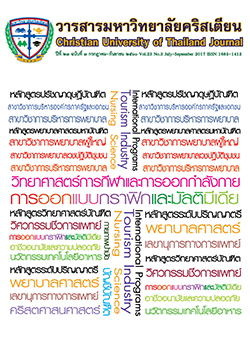A Causal Model of the Factors Influencing the Organizational Effectiveness of Internal Quality Assurance of a Private University in Thailand
Abstract
The purposes of this study were: 1) to study a causal model of Leadership, Customer and System and Process being effect on the Organizational Effectiveness of Internal Quality Assurance of a Private University in Thailand and 2) to check the consistency between a model of the assumption and empirical data on Leadership, Customer and System and Process being effect the Organizational Effectiveness Internal Quality Assurance of a Private University in Thailand. The research study was conducted by sending questionnaires to administrators, faculty and staff of a private university of 339 cases. Data were analyzed by using the statistical programs, structural equation modeling: SEM, multivariate statistics, confirmatory factor analysis, and path analysis. The research findings were as follows: 1. Leadership, Customer and System and Process had effect on the Organizational Effectiveness Internal Quality Assurance of a Private University in Thailand. 2. Leadership had direct effect on the Organizational Internal Quality Assurance of a Private University in Thailand (= 0. 42, p <.05), Customer (
=-0.49, p <.05), System and Process (
= 0.35, p < . 05), Customer had direct effect on System and Process (
= 0.67, p < .05), Organizational Effectiveness Internal Quality Assurance of a Private University in Thailand (
= 0.58, p < .05), System and Process had direct effect on the Organizational Effectiveness Internal Quality Assurance of a Private University in Thailand (
= 0.67, p < .05), Leadership had indirect effect on the Organizational Effectiveness Internal Quality Assurance of a Private University in Thailand in two ways, firstly, through Customer (
= 0.57, p < .05) and Secondly, through Customer and System and Process (
= 0.29, p < .05) The causal model was confirmed with empirical data. The model accounted for 65 % of the variance the Organizational Effectiveness Internal Quality Assurance of a Private University in Thailand. Findings from this research could be used for the university administrators to develop the human resource management., this guideline should focus on business the leadership that considers in the students' needs other clients' needs, and system and process development that walk lead to the effectiveness of private University in Thailand.
References
กระทรวงศึกษาธิการ. (2542). พระราชบัญญัติการศึกษาแห่งชาติ. [ออนไลน์]. สืบค้นเมื่อวันที่ 21 เมษายน พ.ศ. 2560 จาก https://person.mwit.ac.th/01-Statutes/NationalEducation.pdf.
กระทรวงศึกษาธิการ. (2552). กรอบมาตรฐานคุณวุฒิระดับอุดมศึกษาแห่งชาติ. [ออนไลน์]. สืบค้นเมื่อวันที่ 7 มีนาคม พ.ศ.2560 จาก https://www.mua.go.th/users/tqf-hed/.
กระทรวงศึกษาธิการ. (2554). มาตรฐานสถาบันอุดมศึกษา. [ออนไลน์]. สืบค้นเมื่อวันที่ 21 เมษายน พ.ศ. 2560 จาก https://www.mua.go.th/users/bhes/front_home/Announcement/44.pdf.
ช่วงโชติ พันธุเวช. (2547). การจัดการคุณภาพ. กรุงเทพฯ : เพชรเกษมการพิมพ์.
ธวัช กรุดมณี. (2550). การวิเคราะห์ปัจจัยที่ส่งผลต่อประสิทธิผลองค์การของโรงเรียนที่บริหารโดยใช้โรงเรียนเป็นฐาน สังกัดสำนักงานคณะกรรมการการศึกษาขั้นพื้นฐาน. ดุษฎีนิพนธ์ ปริญญาครุศาสตรดุษฎีบัณฑิต สาขาวิชาบริการการศึกษา ภาควิชานโยบาย การจัดการ และความเป็นผู้นำทางการศึกษา คณะครุศาสตร์ จุฬาลงกรณ์มหาวิทยาลัย.
ธวัชชัย ตั้งอุทัยเรือง. (2557). รูปแบบความสัมพันธ์เชิงสาเหตุของประสิทธิผลของโรงเรียนประสิทธิผลของโรงเรียนประถมศึกษาขนาดเล็ก สังกัดสำนักงานคณะกรรมการการศึกษาขั้นพื้นฐานในเขต ภาคกลางของประเทศไทย. ดุษฎีนิพนธ์ ปรัชญาดุษฎีบัณฑิต สาขาวิชาการบริหารการศึกษา บัณฑิตวิทยาลัย มหาวิทยาลัยคริสเตียน.
ปรัชญา เวสารัชช์. (2545). หลักการจัดการศึกษา. กรุงเทพฯ : สำนักงานปฏิรูปการศึกษา.
ปิ่นปินัทธ์ นฤบากบุญทรัพย์. (2553). การพัฒนารูปแบบความสัมพันธ์เชิงสาเหตุประสิทธิผลการบริหารโรงเรียนเอกชนประเภทสามัญศึกษา ในกรุงเทพมหานคร. ดุษฎีนิพนธ์ หลักสูตรปรัชญาดุษฎีบัณฑิต สาขาวิชาการบริหารการศึกษาและภาวะผู้นำ คณะศึกษาศาสตร์ มหาวิทยาลัยเซนต์จอห์น.
ภัธรภร ปุยสุวรรณ. (2557). "แนวทางการมีส่วนร่วมในการบริหารจัดการสถานศึกษาของสมาคมผู้ปกครองและครูที่เหมาะสมกับสังคมไทย". สุทธิปริทัศน์. 28(87) : 345-367.
รุจิราพรรณ คงช่วย. (2556). ปัจจัยเชิงสาเหตุที่มีอิทธิพลต่อประสิทธิผลการจัดการการศึกษาระดับอุดมศึกษาของมหาวิทยาลัยราชภัฏเขตภูมิศาสตร์ภาคใต้. ดุษฎีนิพนธ์ ปรัชญาดุษฎีบัณฑิต สาขาวิชาการบริหารการศึกษา คณะศึกษาศาสตร์ มหาวิทยาลัยสงขลานครินทร์.
วสันต์ สัตยคุณ. (2555). "การพัฒนาตัวบ่งชี้การบริหารโดยใช้โรงเรียนเป็นฐานของสถานศึกษา สังกัดสำนักงานคณะกรรมการการศึกษาขั้นพื้นฐาน". วารสารบริหารการศึกษา มหาวิทยาลัยขอนแก่น. 8(1) : 1-7.
สำนักงานคณะกรรมการการอุดมศึกษา. (2552). เกณฑ์คุณภาพการศึกษาเพื่อการดำเนินการที่เป็นเลิศ 2552-2553. กรุงเทพฯ : ห้างหุ้นส่วนจำกัด ภาพพิมพ์.
สำนักงานคณะกรรมการการอุดมศึกษา. (2556). แผนพัฒนาการศึกษาระดับอุดมศึกษา ฉบับที่ 11 (2555-2559). กรุงเทพฯ : สำนักพิมพ์แห่งจุฬาลงกรณ์มหาวิทยาลัย.
สำนักงานรับรองมาตรฐานและประเมินคุณภาพการศึกษา. (2552). สภาพปัญหาเกี่ยวกับคุณภาพและมาตรฐานการอุดมศึกษา. กรุงเทพฯ : สำนักงานรับรองมาตรฐานและประเมินคุณภาพการศึกษา.
สำนักงานคณะกรรมการการอุดมศึกษา. (2558). คู่มือการประกันคุณภาพการศึกษาภายในระดับอุดมศึกษา พ.ศ. 2557. กรุงเทพฯ : ห้างหุ้นส่วนจำกัด ภาพพิมพ์.
สุกัญญา โฆวิไลกูล. (2547). การวิเคราะห์ระบบเพื่อการบริหารสถาบันอุดมศึกษา. กรุงเทพมหานคร : ศูนย์ตำราและเอกสารทางวิชาการ คณะครุศาสตร์ จุฬาลงกรณ์มหาวิทยาลัย.
สุวรรณา นาควิบูลย์วงศ์. (2549). รูปแบบความรับผิดชอบที่ตรวจสอบได้เพื่อความสำเร็จในการบริหารงานวิชาการของมหาวิทยาลัยเอกชน. ดุษฎีนิพนธ์ ปริญญาศึกษาศาสตรดุษฎีบัณฑิต สาขาวิชาการบริหารการศึกษา บัณฑิตวิทยาลัย มหาวิทยาลัยเกษตรศาสตร์.
Bass, B. M. & Avolio, B. J. (1991). Transformational Leadership Development: Manual for the MultifactorLeadership Questionnaire. Palo Alto, C.A.: Consulting Psychological Press.
Cooke, R.A. & Lafferty, J.L. (1989). Organizational culture inventory. Plymouth, MI: Human Synergistic.
Epstein, J. L. and Salinas, K. C. (2004). "Educational Leadership: Partnering with Families and Community." Schools as Learning Communities. 61(8) : 12-18.
Lado, A. A., Boud, N.G., and Wright, P. (1992). "A competency-based model of sustainable competitive advantage: Toward a conceptual integration." Journal of Management. 18 (1) : 77-91.
Hoy, W. K. & Miskel, C. G. (2008). "Educational administration: Theory, research, and practice, 8th edition." New York: McGraw-Hill.



